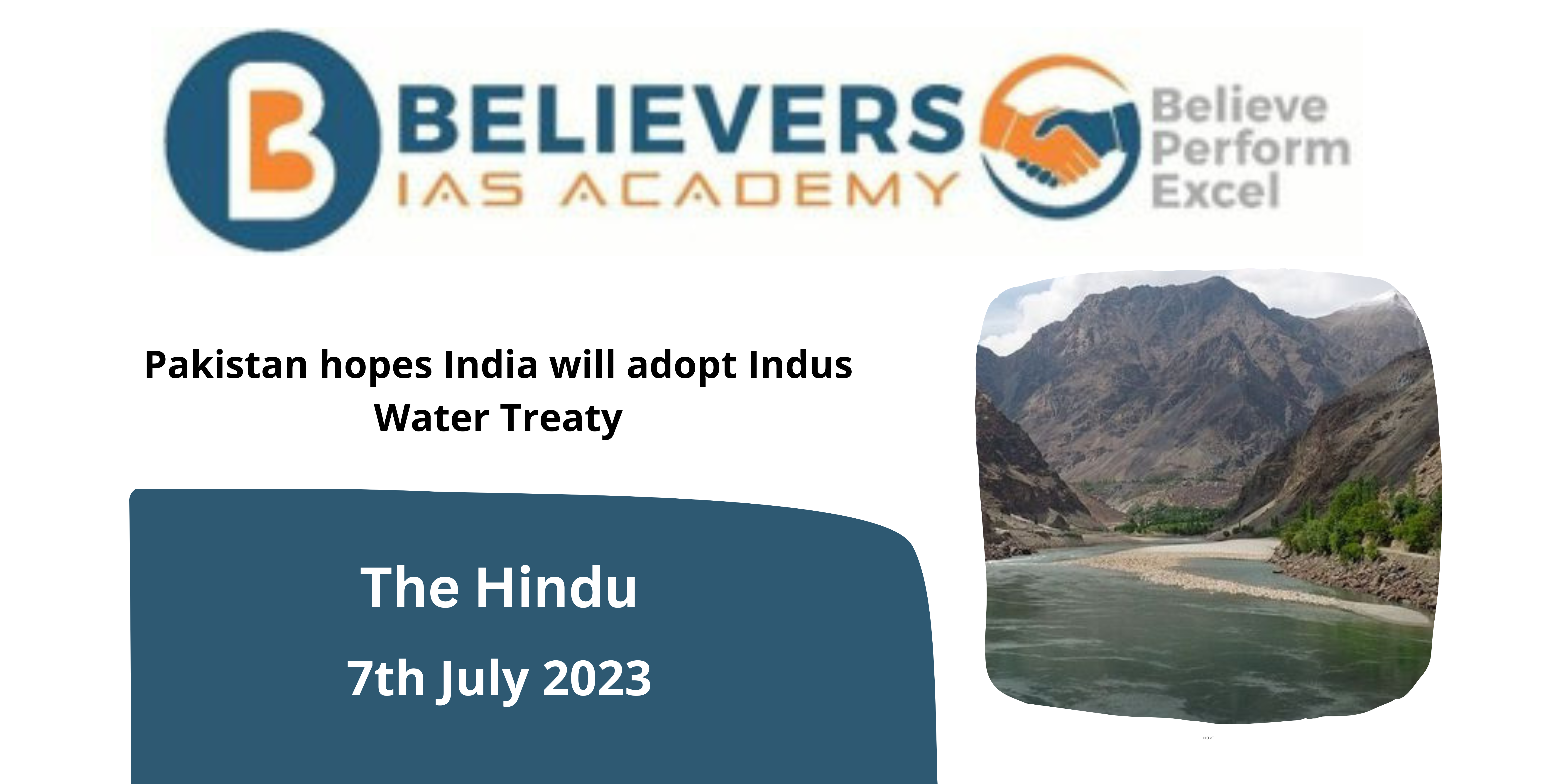Pakistan hopes India will adopt Indus Water Treaty
Context :
Pakistan expressed its hope that India would follow the Indus Waters Treaty in “good faith” after New Delhi declared on Thursday that it cannot be forced to take part in “illegal” proceedings at the Permanent Court of Arbitration regarding the Kishenganga and Ratle hydropower projects in Kashmir.
What is the Indus Water treaty discussed in this context?
- Negotiation and signing: The Indus Waters Treaty was negotiated between India and Pakistan with the World Bank acting as a mediator. Ayub Khan, the president of Pakistan, and Jawaharlal Nehru, the prime minister of India, signed it on September 19, 1960, in Karachi.
- River Division: Eastern rivers and western rivers are the two groups into which the treaty separates the rivers of the Indus basin. Beas, Ravi, and Sutlej are the three eastern rivers under Indian sovereignty; Indus, Chenab, and Jhelum are the three western rivers under Pakistani administration.
- Water Allocation: According to the agreement, Pakistan and India would share the waters of certain rivers. The three eastern rivers’ waters can be used by India for storage, consumption, and irrigation without any restrictions. On the other hand, Pakistan enjoys unlimited access to the western rivers.
- Non-Consumptive Uses: India is permitted to use the waters of the western rivers for non-consumptive uses in addition to irrigation, including power generation, navigation, fish farming, and floating of property.
- Water allocation Criteria: To ensure fair sharing between the two countries, the treaty specifies precise criteria for the allocation of water throughout different seasons and conditions.
- Treaty Principles: The preamble to the treaty highlights India and Pakistan’s goodwill, friendliness, and collaboration to make the most use of the Indus River system. It acknowledges each nation’s rights and duties in regulating the seas.
- Mechanism for Resolving Disputes: The treaty creates a procedure for settling arguments and disagreements between India and Pakistan. It allows the World Bank to designate a Neutral Expert to resolve disagreements that cannot be settled via negotiation.
- Water wars Prevention: Despite their history of military battles, the treaty has been successful in preventing water issues between India and Pakistan. It has made it easier for the two nations to manage and share their water resources in harmony.
- The World Bank’s Role: As the treaty’s custodian and facilitator, the World Bank is extremely important. It aids in the settlement of disputes and keeps an eye on how the terms of the treaty are being carried out.
What is the reason behind the dispute in the case of Indus Water?
- The Kishanganga and Ratle Hydroelectric Projects (HEPs) were the subject of Pakistan’s initial request in 2015 for the appointment of a Neutral Expert to investigate those complaints.
- Pakistan abruptly withdrew its request for a Neutral Expert in 2016 and suggested that a Court of Arbitration rule on its objections instead.
- Per the pertinent dispute resolution clauses of the treaty, Pakistan contacted the World Bank in August 2016 to request the establishment of a Court of Arbitration.
- In response, India filed a different application requesting the appointment of a Neutral Expert rather than an arbitration court.
- India claimed that Pakistan’s bid for a court of arbitration was an infraction of the treaty’s graded system for resolving disputes.
- The term “graded mechanism” refers to a method of resolving disputes where parties first attempt to address the matter through consultation, then submit it to a Neutral Expert, and then, if necessary, to an Arbitration Court.
- The World Bank chose to take India’s proposal for a Neutral Expert into consideration rather than responding to Pakistan’s request for a Court of Arbitration.
- An impartial technical expert is chosen to look into and offer opinions on certain technical issues of the dispute.
- While evaluating India’s application, the World Bank put on hold the selection of a Neutral Expert and Chairman for the Court of Arbitration.
- But after a sizable delay, the World Bank declared in March 2022 that it will restart the selection of a Neutral Expert and a Chairman for the Court of Arbitration.
What is the Court of Arbitration?
- Established: The Permanent Court of Arbitration was established in 1899 during the first Hague Peace Conference. Its goal was to establish a framework for the arbitration of international conflicts in a peaceful manner.
- Location: The Hague, Netherlands is home to the Permanent Court of Arbitration. The Permanent Court of Arbitration’s headquarters and other international law-related organisations are located at the Peace Palace, which was built between 1907 and 1913.
- Nature of the Organization: The Permanent Court of Arbitration is a non-United Nations intergovernmental organisation. It holds the status of a United Nations observer while not being an organisation of the organisation. It can now participate in UN operations because of its constructive connection.
- Services for Conflict Resolution: The Permanent Court of Arbitration serves as an arbitral tribunal and offers services for conflict resolution in connection with agreements made between nations. Member nations, international organisations, or private parties may be participants in these accords.
- Legal Issues Covered: A wide range of legal issues are addressed in the cases heard by the Permanent Court of Arbitration. These include disagreements over national and international trade as well as territorial and maritime issues, human rights, and sovereignty.
- Membership: The 1899 Convention for the Pacific Settlement of International Disputes and the 1907 Convention for the Pacific Settlement of International Disputes are two different multilateral accords that establish the Permanent Court of Arbitration. 122 nations are currently members of the Permanent Court of Arbitration.
- Neutrality and Impartiality: The Permanent Court of Arbitration makes sure that the arbitration process is unbiased and impartial. It offers a venue for parties to a dispute to present their claims and supporting documentation, and a panel of arbitrators is chosen to render a legally enforceable verdict.




